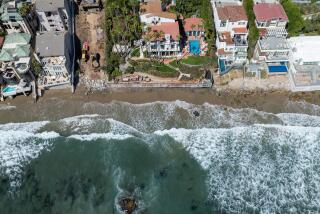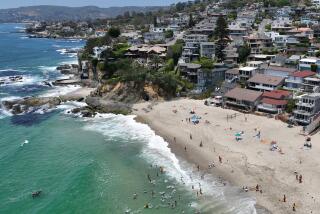Battling over beach access
The California Coastal Act guaranteed public access to the coastline, ensuring that state residents would share equally in their most famous, and perhaps most treasured, resource. Even without a house on the sand, we all have the right to catch a wave or a view of the sunset.
It’s wonderfully democratic, but is it entirely practical? What happens on the coast after sunset can be worrisome. Late at night, the beach can be a magnet for crime. For gang skirmishes, or kids drinking and smoking weed. For uncontrolled bonfires, dangerous swimming and homeless people camping overnight.
As a result, several coastal cities have imposed beach curfews. And the California Coastal Commission, the guardian of public access, has been warning those cities that they don’t have the authority, any more than a private beachfront homeowner can block adjacent stairs to the water.
Most recently, the sand wars are being fought between the commission and the city of Los Angeles over the rousting of late-night visitors to Venice Beach. The city’s beach curfew, which has been on the books for decades, runs from midnight to 5 a.m., though lifeguards acknowledged to Times reporter Tony Barboza that they start clearing the beach at 10 p.m. The commission’s view is that the public has a right to be on the beach 24/7, and that if there is to be any limitation on that, the commission must approve it, just as it would have to approve a housing development that might affect coastal access. The city contends that the commission has no authority at all over laws that restrict beach access.
Both sides have it wrong. Los Angeles cannot unilaterally dictate when it will and will not let people go to the beach. But the commission, too, must be wary of overinterpreting the laws on coastal access to mean that everyone has a right to go wherever they want, whenever they want. Cities have a legitimate interest in reducing crime; the commission cannot allow the coast to become a public nuisance and leave cities with no recourse. Municipal and state parks are routinely closed at night. And although cities should not be able to use curfews as a tactic for driving out the homeless, they’re within their rights to keep the beaches from becoming public campgrounds.
The commission has tried this kind of authoritarian approach before and was rebuffed. A smarter approach would be to call a joint meeting of the affected cities to produce guidelines for curfews that prevent crime while ensuring that beach towns aren’t abusing their authority. Rousting beachgoers at 10 p.m. sounds heavy-handed. And no Californian should have to go through life without seeing the grunion run.
More to Read
Sign up for Essential California
The most important California stories and recommendations in your inbox every morning.
You may occasionally receive promotional content from the Los Angeles Times.










